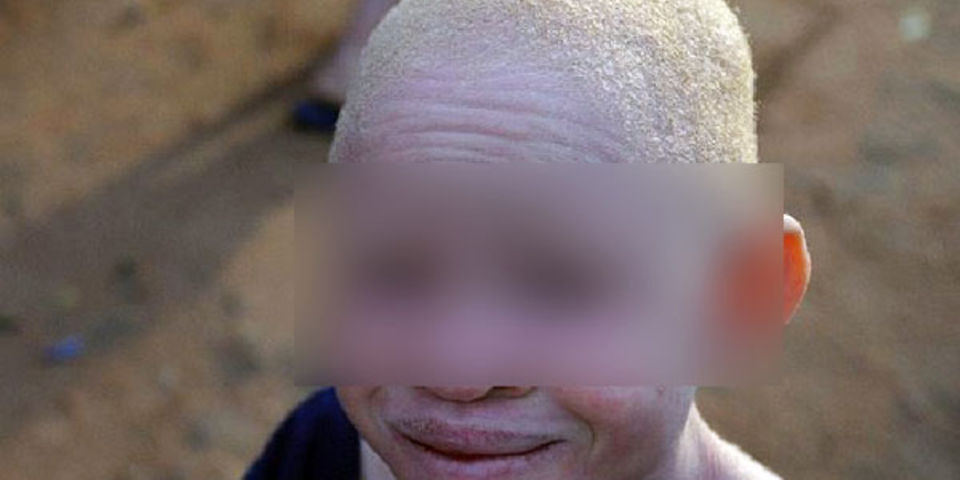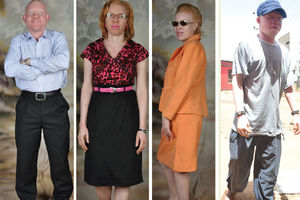
Ms Elizabeth Kwagala Mirembe, the chief coordinator of Matayo Foundation chats with Mr Elijah A. Reagan Yunik, the reigning Mr Ability Uganda during the launch of Mr and Ms Albinism Beaty Contest held in Kampala in August 2024. PHOTOS/JANE NAFULA
When Carol Christine Birungi, 27, graduated from Makerere University with a bachelor's degree in Education, she looked forward to finding a career in the classroom.
Ms Birungi started out by looking for a job as a secondary school history and divinity teacher. Three years and thousands of applications later, it has been one “no” after another.
“I have also sent very many applications via email,” she said. “Every day, I apply for at least two to three jobs using my phone. Most times I am shortlisted, but when I turn up for interviews, they say, ‘We shall call you’ but I never receive any feedback.”
In a country with high unemployment, even qualified applicants often struggle to find jobs. Applicants with disabilities, however, face an added burden of discrimination. Birungi now believes that the problem is not her; it is her skin.
Birungi was born with albinism, a non-contagious condition in which children pick albino genes from their parents.
The condition is characterised by partial or complete melanocyte cells in the skin, hair, and eyes, which are involved in the production of melanin.
People with the condition appear very light due to the absence of the dark pigment, melanin.
This increases their risk of skin cancer and severe visual impairment.
The Ugandan government recognises albinism as a disability and in 2022, the United Nations Human Rights Office estimated that 20,000 people were living with the condition in the country.
Birungi’s story peels back the layers of discrimination that people with albinism are subjected to.
After failing to get a job as a secondary school teacher, she lowered her expectations and redirected her search to kindergartens. After a long search, luck smiled her way when a human resources manager at a nursery school in Wakiso District employed her as a preschool teacher, but the luck did not last.
“The manager gave me the job in the absence of the school director,” Birungi recalled. “When he returned to school and found me teaching, he sent her to come and inform me that they would pay me a salary for two months and then I leave. I had not done anything wrong. So, I just knew that he had not liked me.”
Officials at other schools she sought employment at were more direct in their discrimination; her appearance, some told her to her face, would scare away children.
Mr Hassadu Kirabira, the chairperson of the National Private Educational Institutions Association (NPEIA), said it is improper for a person to be denied employment based on their disability.
“We don't agree with segregation. Employers must respect people and give them jobs based on their experience, qualifications, and qualifications. Albinism doesn't mean that someone is unable to deliver,” he said.
Birungi gave up on her teaching career and started looking for any job that could come her way to earn a living. She lives alone in a two-roomed house rented home in Zana, a suburb on Entebbe Road on the outskirts of the capital, Kampala.
She survives on handouts from her foster mother. “I graduated in 2021 and since then, I have written several applications, but I have failed to get a job. These are some of my application letters,” she said as she flipped through a stack of weathered paperwork.
Some would-be employers want Birungi, but for entirely different reasons, believing that a sexual encounter with someone living with albinism cures HIV, the virus that causes Aids, or brings wealth. None of the claims are true according to health and financial experts.
With her teaching dreams turned to chalk dust, Birungi sought work as a waitress or housekeeper but was rebuffed, again, that she would scare away clients. So, she borrowed some money from her foster mother to start her own business making and selling samosas, chapatis and fresh juice but would-be clients, chained to suspicion and ignorance, stayed away.
Birungi then tried her hand at selling second-hand clothes for children and women but even here, clients stayed away, worried that they could catch the condition. Whatever she tried, Birungi could not escape from the shadow of her skin.
Life in the shadows
For many people born with disabilities such as albinism, discrimination is life-long. Birungi grew up believing that her foster mother was her biological parent. She paid for her education and to this day helps her pay the rent and buys the special creams her sensitive skin needs.
In 2019, however, just as Birungi was joining university, her foster mother revealed that she was not, in fact, her biological mother but a Good Samaritan who had taken her in from Makerere Full Gospel Church area when she was about five years old.
“I was told that I used to live within the premises of this church and this is where she picked me from. My parents had abandoned me,” Birungi said.

With the help of an online blogger, Birungi began the search for her biological parents, who were said to be in Mbale District, in eastern Uganda. Eventually, a lady who said she was from Mbale and claimed to be her biological mother showed up. She said Birungi’s father had rejected her immediately after she was born, arguing that they did not have any people with albinism in their clan. Given an impossible choice, Birungi’s mother chose her marriage over her daughter. It wasn’t the last time.
“When I met her on [the university] campus for the very first time, we did not connect because I was seeing her for the very first time and she spoke Kiswahili, which I didn't understand so well having grown up in central Uganda,” Birungi recalled, adding, “She left and said she would call when she needed me. But she has never.”
Birungi spends most of her time attending church, hoping and praying for better fortunes and the chance to work. She appeals to employers to give people with disabilities a chance to work if they can, and to the government to skill those who are up to it to try self-employment.
Fighting stigma
In 2022, the government launched the National Action Plan 2020-2025 for Albinism. It calls for mass education to dispel misconceptions and biases surrounding persons with albinism, as well as increasing access to health care, employment, education, and other opportunities.
A research report quoted by the Ministry of Gender, Enhancing Equality Countering Discrimination against Persons with Albinism shows that people with albinism are among those left the farthest behind in Ugandan society.
The report noted that the absence of a systemic plan to help the community has allowed stigma and discrimination against people with albinism to fester. This has affected their ability to fully enjoy their rights to equality and non-discrimination, health, education, work, social protection and security, among others.
Mr Samson Masiga, the principal rehabilitation officer in the Ministry of Gender, Labour and Social Development said people with disabilities should be considered by employers as long as they qualify and can do the work they are applying for.
Mr Masiga also advised parents and guardians of children with albinism to raise them without discrimination. He noted that the recognition of albinism as a form of disability by the Persons with Disabilities Act, 2019 was a key step towards addressing the discrimination.
He added that Parliament, the Uganda Human Rights Commission, and the Equal Opportunities Commission have supported initiatives for more inclusion and elimination of discrimination against people with albinism. Uganda is also a signatory to international instruments that advocate for the rights of persons living with disabilities.
He further stated that the Ministry of Gender Labour and Social Development continues to partner with associations and groups of persons with disabilities to empower their members economically.
Ms Olive Namutebi, the executive director of Albinism Umbrella, which includes 452 organisations, said some of their members are engaged in income-generating activities with support from the Ministry of Gender, Labour and Social Development.
Ms Namutebi admitted that unemployment is a huge problem faced by people living with disabilities, including albinism. An estimated 12.4 percent of the national population -- more than four million Ugandans -- are estimated to live with at least one disability.
Ms Grace Nabakooza, a senior legal advisor at the Federation of Uganda Employers attributed the discrimination to a lack of awareness.
“We are well aware that discrimination is prohibited by the Constitution of Uganda as well as the Employment Act 2006,” she said, adding: “We, therefore, take the opportunity to encourage employers not to practice discriminatory practices in the workplace and also take advantage of the incentives enshrined in the Disability Act to put in place reasonable accommodations for employment of differently-abled persons.”
Ms Leah Diana Seera, who heads inclusive education at the National Union for Disabled Persons in Uganda (NUDIPU), said consistent advocacy for the rights of persons with disability is critical in addressing stigma and discrimination. NUDIPU, she added, is advocating for the employment rights of differently-abled people.
She added that the Union has set up a portal where employers willing to take on professionals including doctors, teachers, and engineers with disabilities can advertise available opportunities. She, however, said the pace is still slow and only 10 to 15 people find jobs this way each year.
Mr Matayo Twinomujuni, the head of Matayo Foundation, a non-profit that skills people living with albinism, stressed the need to skill them in different disciplines to empower them economically.
In Uganda, an estimated 12.4 percent of the national population has a disability, and an estimated 22 percent of unemployed Ugandans have a disability. Research indicates that persons with disabilities have less opportunity for employment due to several factors.
Mr John Chris Ninsiima, director of programmes at the National Union of Persons with Disabilities in Uganda says persons with disabilities are the worst hit due to low levels of education, historical discrimination, biases by employers and sometimes low esteem.
Mr Ninsiima says the few with education qualifications often attend less competitive academic programmes. Many of them end up working with organisations working to advocate for the rights of people living with disabilities.








